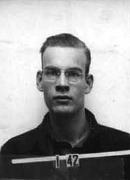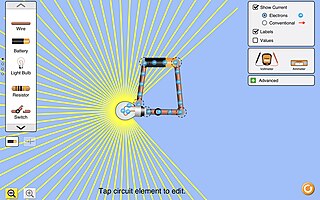
Carl Edwin Wieman is an American physicist and educationist at Stanford University, and currently the A.D White Professor at Large at Cornell University. In 1995, while at the University of Colorado Boulder, he and Eric Allin Cornell produced the first true Bose–Einstein condensate (BEC) and, in 2001, they and Wolfgang Ketterle were awarded the Nobel Prize in Physics. Wieman currently holds a joint appointment as Professor of Physics and Professor in the Stanford Graduate School of Education, as well as the DRC Professor in the Stanford University School of Engineering. In 2020, Wieman was awarded the Yidan Prize in Education Research for "his contribution in developing new techniques and tools in STEM education." citation.

The University of Colorado Boulder is a public research university in Boulder, Colorado, United States. Founded in 1876, five months before Colorado became a state, it is the flagship university of the University of Colorado system. CU Boulder is a member of the Association of American Universities and is classified among R1: Doctoral Universities – Very high research activity.

Albert Allen Bartlett was an American professor of physics at the University of Colorado at Boulder. As of July 2001 Professor Bartlett had lectured over 1,742 times since September, 1969 on Arithmetic, Population, and Energy. Bartlett regarded the word combination "sustainable growth" as an oxymoron, and argued that modest annual percentage population increases could lead to exponential growth. He therefore regarded human overpopulation as "The Greatest Challenge" facing humanity.
The Learning Assistant Model supports curriculum and course transformation, discipline-based education research, institutional transformation, and teacher recruitment. The LA Model supports transforming courses to align with research-based instructional strategies through hiring Learning Assistants to facilitate evidence based, small group learning activities. Learning Assistants are undergraduate students who, through the guidance of weekly preparation sessions and a pedagogy course, facilitate discussions among groups of students in a variety of classroom settings that encourage active engagement. The LA Model is adopted by and implemented at local institutions who create their own LA Program.
John A. Knox is a meteorologist who researches clear-air turbulence (CAT) and who also received media attention for discussing ways of calculating the mathematical constant e, together with inventor Harlan J. Brothers. He is a professor at the University of Georgia and has been nationally honored for his undergraduate teaching.

Michael Lee Wesch is a professor of cultural anthropology and a University Distinguished Teaching Scholar at Kansas State University. He is known for his classroom work with new media and for creating videos published on Youtube about digital technology, including "The Machine is Us/ing Us" (2007), and "An Anthropological Introduction to YouTube" (2008).

The University of Colorado Anschutz Medical Campus is the academic health sciences campus in Aurora, Colorado that houses the University of Colorado's six health sciences-related schools and colleges, including the University of Colorado School of Medicine, the CU Skaggs School of Pharmacy and Pharmaceutical Sciences, the CU College of Nursing, the University of Colorado School of Dental Medicine, and the Colorado School of Public Health, as well as the graduate school for various fields in the biological and biomedical sciences. The campus also includes the 184-acre (0.74 km2) Fitzsimons Innovation Community, UCHealth University of Colorado Hospital, Children's Hospital Colorado, the Rocky Mountain Regional Veterans Affairs hospital, and a residential/retail town center known as 21 Fitzsimons. CU Anschutz is the largest academic health center in the Rocky Mountain region.

David Hawkins was an American scientist whose interests included the philosophy of science, mathematics, economics, childhood science education, and ethics. He was also an administrative assistant at the Manhattan Project's Los Alamos Laboratory and later one of its official historians. Together with Herbert A. Simon, he discovered and proved the Hawkins–Simon theorem.
Ernest LeRoy Boyer was an American educator who most notably served as Chancellor of the State University of New York, United States Commissioner of Education, and President of the Carnegie Foundation for the Advancement of Teaching. Boyer was recipient of numerous awards, including over 140 honorary doctorates.
John A. Pollock, is a Full Professor of Biological Science at Duquesne University Bayer School of Natural and Environmental Sciences, where he researches and teaches molecular neurobiology. He is Principal Investigator for The Partnership in Education, a non-profit multidisciplinary health literacy and informal science education project at Duquesne University funded primarily through a Science Education Partnership Award(SEPA) from the National Institute of General Medical Sciences, a component of the National Institutes of Health.
The Richtmyer Memorial Award is an award for physics education, named for physicist Floyd K. Richtmyer and given annually by the American Association of Physics Teachers. Its recipients include over 15 Nobel Prize winners.
Christopher Sorensen is the Cortelyou-Rust University Distinguished Professor and a University Distinguished Teaching Scholar in the Kansas State University Physics Department. He also is an adjunct professor in the department of chemistry at Kansas State University. He was named the Carnegie Foundation and Council for Advancement and Support of Education United States Professor of the Year for doctoral and research universities in 2007. His research interests include materials synthesis including graphene materials, light scattering, particulate systems, and soft matter physics.

PhET Interactive Simulations, a project at the University of Colorado Boulder, is a non-profit open educational resource project that creates and hosts explorable explanations. It was founded in 2002 by Nobel Laureate Carl Wieman. PhET began with Wieman's vision to improve the way science is taught and learned. Their stated mission is "To advance science and math literacy and education worldwide through free interactive simulations."
Sheri D. Sheppard is the Burton J. and Deedee McMurtry University Fellow in Undergraduate Education; Associate Vice Provost of Graduate Education; and Associate Chair for Undergraduate Curriculum, Mechanical Engineering, Stanford University. She focuses her teaching on engineering design for undergraduate and graduate students. In November 2014, the Carnegie Foundation bestowed on her the U.S. Professor of the Year award.
Robert B. Schnabel is an American computer scientist. He was executive director and CEO of the Association for Computing Machinery (ACM) from November 1, 2015 to 2017. He is now professor and external chair of computer science at University of Colorado Boulder.

Timothy Laurence Killeen is a British and American geophysicist, space scientist, professor, and university administrator. Killeen took office as the president of the University of Illinois system in 2015. He has been the principal investigator on research projects for NASA and the National Science Foundation. Killeen has authored more than 150 publications in peer-reviewed journals as well as more than 300 other publications and papers. He has served on various White House committees and task forces and is a past editor-in-chief of the Journal of Atmospheric and Solar-Terrestrial Physics.
Noah David Finkelstein is a professor of physics at the University of Colorado Boulder. He is a founding co-director of the Colorado Center for STEM Learning, a President’s Teaching Scholar, and the inaugural Timmerhaus Teaching Ambassador. His research focuses on physics education and on developing models of context, the scope of which involves students, departments, and institutional scales of transformation. In 2010, Finkelstein testified to the United States House Committee on Science, Space and Technology on how to strengthen undergraduate and postgraduate STEM education.
Sherry J. Yennello is an American nuclear chemist and an Elected Fellow of the American Association for the Advancement of Science. She is a Regents Professor and the holder of the Cyclotron Institute Bright Chair in Nuclear Science, who currently serves as the Director of the Cyclotron Institute at Texas A&M University. She is also a Fellow of the American Chemical Society and the American Physical Society. She has authored as well as co-authored more than 530 peer reviewed journal articles and has conducted many invited talks, presentations and seminars at several prestigious academic conferences and scholarly lectures.

Heather Lewandowski is a professor of physics at the University of Colorado Boulder. She looks to understand the quantum mechanical processes in making chemical bonds. She uses time-varying inhomogeneous electric fields to achieve supersonic cooling. She also studies how students learn experimental skills in instructional physics labs and help to improve student learning in these environments. She is a Fellow of the American Physical Society.
Patricia Rankin is a British high energy physicist, equity researcher and Chair of the Department at the Arizona State University. Her research considers high energy particle physics and gender balance in scientific disciplines. She was previously responsible for the high energy physics section of the National Science Foundation.








